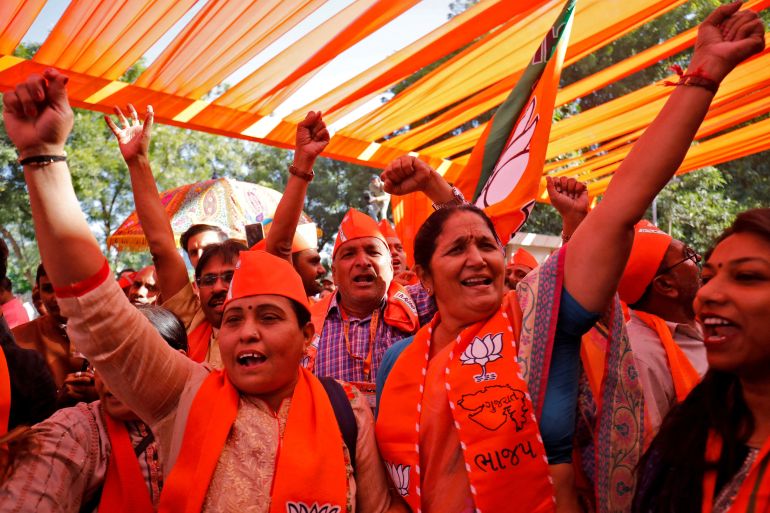Anti-Muslim hate speech in India spikes around elections, report says
Hindutva Watch report says the ruling BJP is linked to an ‘escalating trend’ of anti-Muslim hate speech in the country.

Anti-Muslim hate speech incidents in India averaged more than one a day in the first half of 2023 and were seen most in states with upcoming elections, according to a report by Hindutva Watch, a Washington-based group monitoring attacks on minorities.
There were 255 documented incidents of hate speech gatherings targeting Muslims in the first half of 2023, said the report published on Monday. There was no comparative data for prior years.
Keep reading
list of 4 itemsSpike in anti-Muslim rallies since BJP retook India’s Maharashtra
India’s opposition alliance to boycott ‘hate-filled’ TV news anchors
Will India’s future generations forgive its decay into anti-Muslim hatred?
The group used the United Nations’ definition of hate speech as “any form of communication … that employs prejudiced or discriminatory language towards an individual or group based on attributes such as religion, ethnicity, nationality, race, color, descent, gender, or other identity factors”.
About 70 percent of the incidents took place in states scheduled to hold elections in 2023 and 2024, according to the report. It added that 80 percent of the hate speech events took place in states governed by Prime Minister Narendra Modi’s Hindu nationalist Bharatiya Janata Party (BJP).
#Report—— 255 documented incidents of hate speech events/gatherings targeting Muslims recorded in the first half of 2023. Overwhelmingly, 205 (80%) of these hate speech events occurred in BJP-ruled states and union territories.
Read the full report here: https://t.co/RFpLx8Ac1C pic.twitter.com/URqtmLuc7a
— HindutvaWatch (@HindutvaWatchIn) September 26, 2023
Maharashtra, Karnataka, Madhya Pradesh, Rajasthan and Gujarat states witnessed the highest number of hate speech gatherings with Maharashtra accounting for 29 percent of such incidents, the report found.
The majority of the hate speech events mentioned conspiracy theories and calls for violence and socioeconomic boycotts against Muslims.
Hindutva Watch said it tracked online activity of Hindu right-wing groups, verified videos of hate speeches posted on social media and compiled data on isolated incidents reported by media.
Modi’s government denies the presence of minority abuse. The Indian embassy in Washington did not respond to a request for comment.
Abu Asim Azmi, a Muslim legislator from Mumbai, capital of Maharashtra, told Al Jazeera the “anti-terror law should be invoked” to control hate speech.
“The Supreme Court has already made strong observations about hate speech. Have the governments become so impotent that they can’t act on it?” he asked. “If the law and order situation has deteriorated in the country, 70 percent of it is because of hate speech.”
Azmi said hate speeches are being made even inside the Indian Parliament. He was referring to last week’s incident when a BJP parliamentarian made Islamophobic and racist remarks against a Muslim MP during a debate.
“The people who have taken oaths on the constitution are making such remarks. There could be nothing more shameful than this,” Azmi told Al Jazeera.
Rights groups also alleged mistreatment of Muslims under Modi, who became the prime minister in 2014.
They point to a 2019 citizenship law described as “fundamentally discriminatory” by the UN Human Rights Office for excluding Muslim migrants, anti-conversion legislation challenging the constitutionally protected right to freedom of belief and the 2019 revocation of Muslim-majority Kashmir’s semiautonomous status.
There has also been demolition of Muslim properties in the name of removing illegal construction and a ban on wearing the hijab in classrooms in Karnataka when the BJP was in power in that southern state.
In response, BJP spokesman Tom Vadakkan blamed the opposition parties for allegedly “promoting hate speech”.
“If you talk about the hate speech made by a BJP MP in parliament, it’s a matter with the [parliamentary] speaker who will take action,” he told Al Jazeera.
“On what basis is the report saying 80 percent of hate speeches were made in the BJP-rule states?” he added.
But activist and journalist Teesta Setalvad said hate “flows from the top” in India. “Hate is a state policy and used for political mobilisation,” she said.
Setalvad said elected officials in constitutional positions have used slur, stigma and abuse against India’s minorities, mainly Muslims. “States going to polls are predominantly the sites of such instigatory speech,” she told Al Jazeera, adding that there is little action against the perpetrators despite the outrage.
“It’s the silence of complicity. It is this silence and the impunity enjoyed by criminal perpetrators of hate that has made the everyday lives of Indian minorities fragile and vulnerable.”
Additional reporting by Waquar Hasan from New Delhi, India